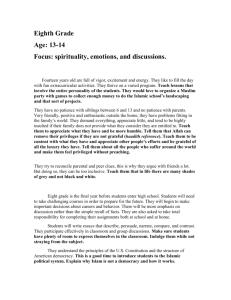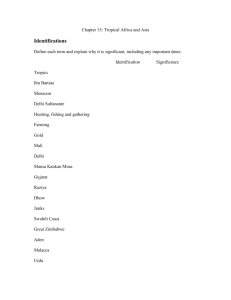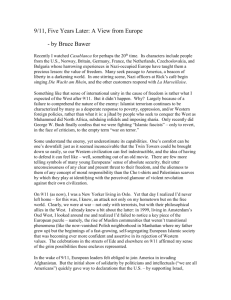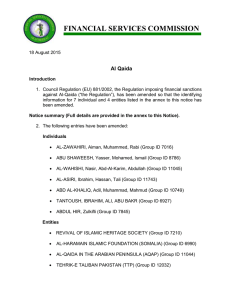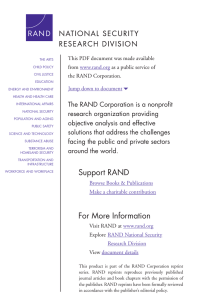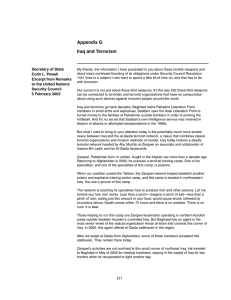Political Islam Online
advertisement
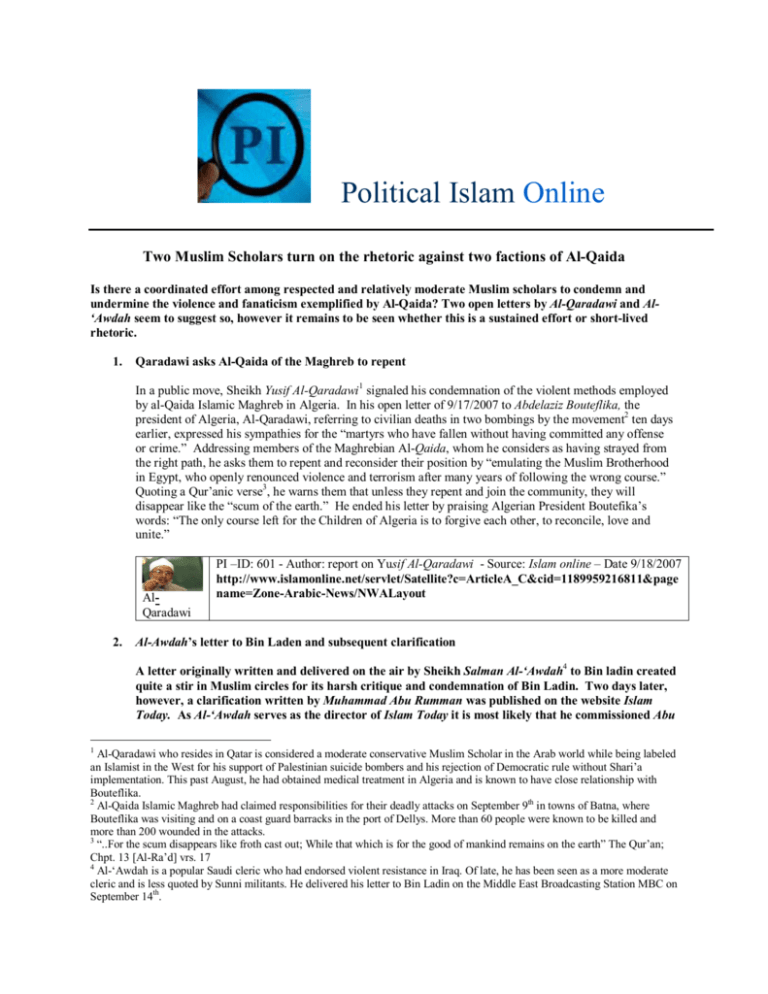
Political Islam Online Two Muslim Scholars turn on the rhetoric against two factions of Al-Qaida Is there a coordinated effort among respected and relatively moderate Muslim scholars to condemn and undermine the violence and fanaticism exemplified by Al-Qaida? Two open letters by Al-Qaradawi and Al‘Awdah seem to suggest so, however it remains to be seen whether this is a sustained effort or short-lived rhetoric. 1. Qaradawi asks Al-Qaida of the Maghreb to repent In a public move, Sheikh Yusif Al-Qaradawi 1 signaled his condemnation of the violent methods employed by al-Qaida Islamic Maghreb in Algeria. In his open letter of 9/17/2007 to Abdelaziz Bouteflika, the president of Algeria, Al-Qaradawi, referring to civilian deaths in two bombings by the movement2 ten days earlier, expressed his sympathies for the “martyrs who have fallen without having committed any offense or crime.” Addressing members of the Maghrebian Al-Qaida, whom he considers as having strayed from the right path, he asks them to repent and reconsider their position by “emulating the Muslim Brotherhood in Egypt, who openly renounced violence and terrorism after many years of following the wrong course.” Quoting a Qur’anic verse3, he warns them that unless they repent and join the community, they will disappear like the “scum of the earth.” He ended his letter by praising Algerian President Boutefika’s words: “The only course left for the Children of Algeria is to forgive each other, to reconcile, love and unite.” AlQaradawi 2. PI –ID: 601 - Author: report on Yusif Al-Qaradawi - Source: Islam online – Date 9/18/2007 http://www.islamonline.net/servlet/Satellite?c=ArticleA_C&cid=1189959216811&page name=Zone-Arabic-News/NWALayout Al-Awdah’s letter to Bin Laden and subsequent clarification A letter originally written and delivered on the air by Sheikh Salman Al-‘Awdah4 to Bin ladin created quite a stir in Muslim circles for its harsh critique and condemnation of Bin Ladin. Two days later, however, a clarification written by Muhammad Abu Rumman was published on the website Islam Today. As Al-‘Awdah serves as the director of Islam Today it is most likely that he commissioned Abu 1 Al-Qaradawi who resides in Qatar is considered a moderate conservative Muslim Scholar in the Arab world while being labeled an Islamist in the West for his support of Palestinian suicide bombers and his rejection of Democratic rule without Shari’a implementation. This past August, he had obtained medical treatment in Algeria and is known to have close relationship with Bouteflika. 2 Al-Qaida Islamic Maghreb had claimed responsibilities for their deadly attacks on September 9th in towns of Batna, where Bouteflika was visiting and on a coast guard barracks in the port of Dellys. More than 60 people were known to be killed and more than 200 wounded in the attacks. 3 “..For the scum disappears like froth cast out; While that which is for the good of mankind remains on the earth” The Qur’an; Chpt. 13 [Al-Ra’d] vrs. 17 4 Al-‘Awdah is a popular Saudi cleric who had endorsed violent resistance in Iraq. Of late, he has been seen as a more moderate cleric and is less quoted by Sunni militants. He delivered his letter to Bin Ladin on the Middle East Broadcasting Station MBC on September 14th. Rumman’s “clarification.” If so, it could fairly be described as “backtracking.” Abu Rumman characterized Al-‘Awdah’s letter less as a departure from jihad, and more as a difference in opinion as to the appropriate tactic to employ in jihad. Abu Rumman’s article “From Al-Awdah to Bin Laden: Islam between two strategies” in Islamtoday describes Al-‘Awdah’s message as a different understanding of Islam, a departure from the frightful slippery road pursued by Al-Qaida where violence has become an end rather than a means, “a violence which has consumed the youth and inflicted more harm on the Arab and Muslim societies than on others.” The writer suggests that the subtle question in Al-‘Awdah’s message is: To what extent did the Muslim and Arab world benefit from the actions of Al-Qaida? Abu Rumman insists that Al-‘Awdah had no intention of defending occupation in general or of absolving the Arab regimes, but rather to clarify the difference between the methods of Al-Qaida in applying Jihad and the methods of other reformers and scholars like himself. Abu Rumman suggests that Al-Awdah’s message is also an indirect criticism of those Islamic movements which are hesitant to condemn the violence and therefore forego a constructive role under the pretext of the ongoing political struggle. The writer concludes that Al-Awdah did not intend to question the legitimacy of fighting hegemony, internal tyranny or the occupation, but rather to establish an effective, alternate strategy guaranteeing success. PI –ID: 602 – - Source: Islamtoday– Date 9/16/2007 http://www.islamtoday.net/albasheer/show_articles_content.cfm?id=72&catid=79&artid=10135 Al‘Awdah





